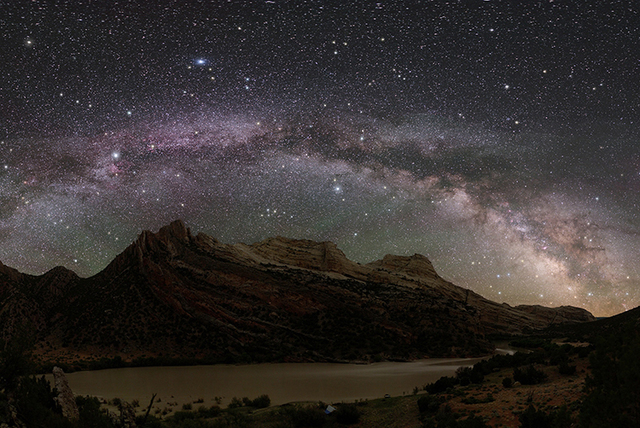The Milky Way is hidden from one third of humanity
Our view of the heavens isn’t what it used to be.
Nearly 4 out of every 5 people on Earth - including 99 percent of those living in the United States and Europe - now live under light-polluted skies, according to scientists who have created a state-of-the-art atlas of the problem across the globe. They found that more than one-third of humanity can no longer see the Milky Way, even on the clearest night. Light pollution has reached such levels in some countries that people never experience a true night sky, because it is perpetually masked by the glow of an artificial twilight.
“Most of the world is affected by this problem, and humanity has enveloped our planet in a luminous fog that prevents most of Earth’s population from having the opportunity to view our galaxy,” the researchers behind the effort wrote in a study published Friday in the journal Science Advances.
More than a decade ago, some of the same researchers created the first world atlas of artificial night-sky brightness. But the updated version published Friday employs more sophisticated tools, such as imaging data from a high-resolution satellite operated by the National Oceanic and Atmospheric Administration. The result is a detailed global map of light pollution, which scientists consider to be the level of brightness at which artificial light substantially obscures astronomical observations.
“As light hits molecules and particles in the atmosphere, it gets scattered, ” said Chris Elvidge, a co-author and a physical scientist for NOAA. “It’s light coming from the sky down toward us that blocks our ability to see the stars.”
As populations grow and cities expand, more and more areas on Earth have a hazier view of the night sky, he said.
Friday’s study found that the world’s most light-polluted country is Singapore, where the entire population lives under skies so bright that the human eye never fully adapts to night vision. Citizens of other countries such as Kuwait, Saudi Arabia, South Korea, Israel and Argentina also have almost entirely obstructed views of the night sky. Not everyone on Earth lives under light-polluted skies, of course. Madagascar, Chad and Central African Republic are among the least-affected countries, with three-quarters of their inhabitants living under skies unimpeded by artificial night light.
But in some parts of the world, the problem is so pervasive that people must travel long distances to reach a piece of land where it’s possible to see a pristine night sky. The authors wrote that the location on Earth farthest from having the possibility of seeing a hint of the Milky Way is an area near Cairo in the Nile Delta. Other areas where the Milky Way is no longer visible include parts of Belgium and Germany, areas around Beijing and Hong Kong, and other cities such as London, Boston and Washington.
“By now, we’ve had a couple generations of people in urban areas who have been cut off from seeing features like the Milky Way,” Elvidge said.
People in Paris would have to travel more than 500 miles to find skies largely unaffected by light pollution, the study found. For people near Neuchatel, Switzerland, finding a near-flawless sky would require a trip of nearly 850 miles or more to parts of Scotland, Algeria or Ukraine.
“Growing up in Southern California in the 1960s and ’70s, my family and I didn’t have to go very far to see a pretty good night sky, and that isn’t true anymore,” said Dan Duriscoe, a co-author of Friday’s study and veteran of the National Park Service. “Somebody should care about this in a manner that leaves areas alone, so people have access to this without excessive expense or travel.” To think of a future where it requires a pilgrimage just to see an unimpeded night sky, he said, “would be tragic.”
The worries over light pollution extend beyond aesthetics. Scientists have studied a broad range of other potential economic, ecological and health consequences. Some research suggests that the problem can disrupt the world’s ecosystems, altering the way some animals eat, sleep, reproduce and hunt. Evidence also suggests that artificial light at night can upend the circadian rhythms that humans depend on, increasing the risk of health problems such as depression, diabetes, sleep disorders, obesity and breast cancer.
Friday’s study noted that there are strategies and technologies that increasingly are being used to mitigate the effects of light pollution, such as street lamps that direct light only downward and “adaptive lighting,” which can use sensors to lower the outdoor lighting at night, especially during periods of little or no traffic.
But the authors behind the new global atlas said that despite those hopeful signs, the world’s growing population — not to mention the threat of indifference to light pollution — could lead the problem to get only worse. And that would be a shame, they said.
“We all have an idea that the view of the night sky should be one of these cultural monuments, that there has to be a place you can go and experience it,” Duriscoe said.
“One viewpoint is that it doesn’t matter, because most of us are busy doing other things at night,” Elvidge added. “Another viewpoint is that our ancestors and our civilization grew up with people literally studying the skies. At least when I’ve been out in places with a very clear sky, a dark sky, and you look up and see the number of stars out there, it’s awe-inspiring. I feel some enhanced connection to the cosmos.”

















